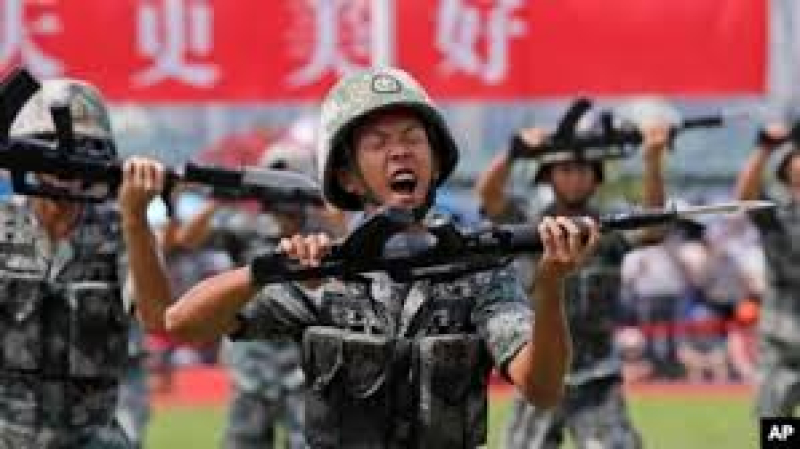- Janaza of six Bangladeshi peacekeepers held at Dhaka Cantonment |
- Bangladesh stock market loses Tk 10,500cr in a week |
- Dhaka’s air turns ‘very unhealthy’ on Sunday morning |
- Project to transform N’ganj into a climate-resilient green city |
- Sustainable, rights-based solutions to Rohingya crisis urged |
China takes steps to expand military training in schools

China says it has begun revising its National Defense Education Law, a move analysts say aims to expand military training at universities, high schools and even middle schools. The proposed changes also seek to improve defense education starting with students as young as primary school.
According to state media reports, the Standing Committee of China's National People's Congress – the country's rubber stamp legislature – began its first reading of the revisions last week. The changes are also open for public comment until late May, though it is unlikely that a broader debate will be allowed.
While the previous version of the law was a looser guide, the proposed changes say high school students and those at institutions of higher learning should receive basic military training during school. Junior high school students are also allowed to receive military training, according to the revisions, reports VOA.
In addition, the responsibility for military training is put more squarely on central and party authorities, the Ministry of Education and the Communist Party's Central Military Commission – China's top national defense body. The revisions also call on local military bases and central authorities to strengthen the direction, oversight and organization of military training for students.
State media have offered some details on the revisions, noting that the changes are for "national defense awareness" for all of society and to help the world's second-biggest economy adapt to "many new domestic and international changes." Reports, however, do not elaborate on what that might mean.
Analysts who spoke with VOA's Mandarin Service see a connection between the proposed changes and the impact China's economic downturn and global geopolitical tensions are having on the ruling Chinese Communist Party, or CCP.
Timothy Heath, a senior fellow for international defense at the RAND Corp., says the revisions are part of a more systematic approach to national defense education that aims to strengthen Chinese leader Xi Jinping's authority.
"The attempt to legislate loyalty betrays the reality of declining popular support for the CCP amid a softening economy, worsening real estate market, and persistent corruption and malfeasance," Heath said in an emailed response. "The law also reflects the CCP's anxiety over an increasingly unsettled international order in which conflicts appear to be rising."
Willy Lam, a senior fellow at the Jamestown Foundation, said that since Xi took over in 2012, he has focused on patriotism and national defense awareness. Last year, China's Defense Ministry also confirmed an ongoing push to embed militias, known as the "People's Armed Forces" in Chinese companies and state-owned enterprises.
"This is all aimed at strengthening the public's preparation for military struggle," Lam said.
Although it is not clear when the revisions will be passed, the changes follow a string of other national security moves by Beijing over the past year. Those include last year's passage of revisions to an anti-espionage law, a broad and ongoing public campaign to counter foreign spies and changes to the country's Patriotic Education Law, which went into effect in January.
Over the past year, U.S. officials have repeatedly noted China's aim to have the capability to invade Taiwan by 2027. China claims democratically ruled Taiwan as part of its territory. Beijing says unification is the only option for the island of 23 million, and that that must happen, by force, if necessary.
Analysts also say that while the extra emphasis on national defense awareness could feed into already rising nationalist sentiments and feed hostility or prejudice against the outside world, it could also encourage more young Chinese to join the military.
"The law may aim in part to bolster recruitment for the PLA [People's Liberation Army], which has consistently failed to attract adequate numbers of educated young people, despite high unemployment rates for urban youth," Heath said.
China's National Defense Education Law was first passed in 2001 and last modified in 2018.

